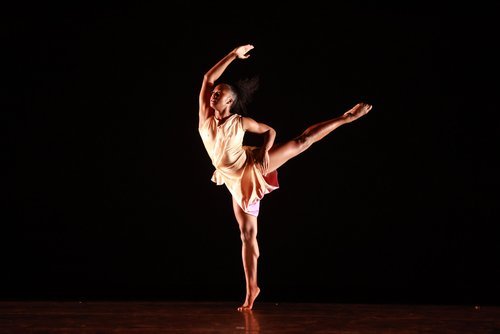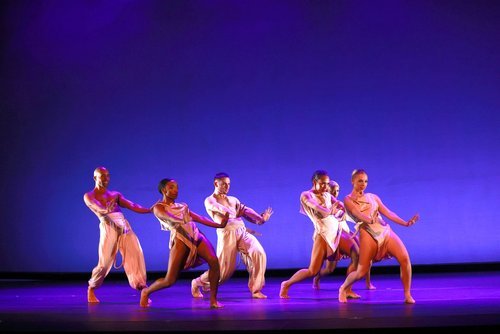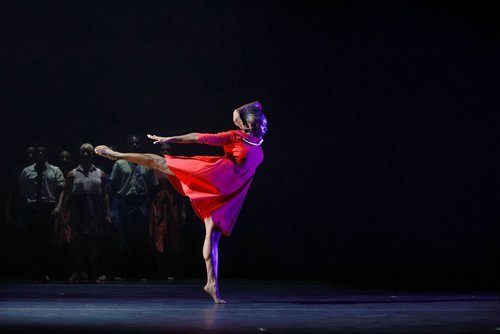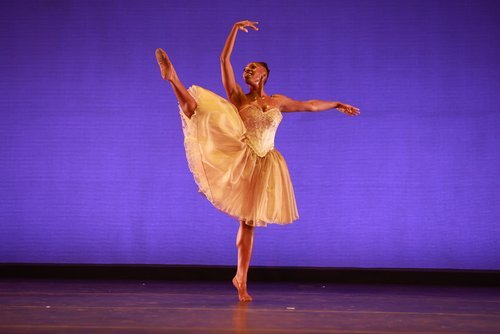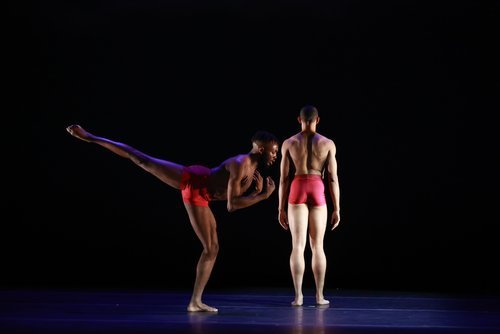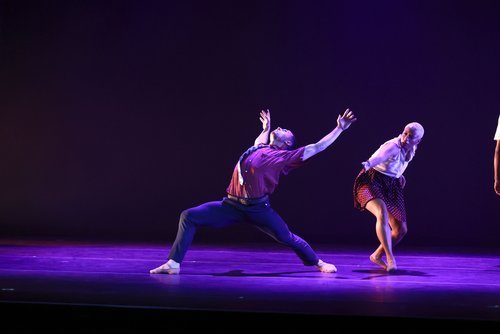“Director’s Choice” @ Dallas Black Dance Theatre
—Gregory Sullivan Isaacs
The Dallas Black Dance Theatre dazzled this weekend at the Dee and Charles Wyly Theatre in a program titled “Director’s Choice.” The evening presented an amalgamation of world-class dancers and internationally recognized choreographers, with messages about love, joy, pain, legacy—and the societal struggles we experience on a daily basis. Said DBDT artistic director Melissa M. Young: “I have a deep fondness for the choreographers on this program because each of them have played an important role or have some type of connection to my personal artistic journey. The investment of elevating the art form of Dance far beyond shape shifting, and creating moments that have a lasting impact, is important to me. Plus, I find that a diverse, well-balanced program is what audiences love most.”
The opening piece, choreographer Darrell Grand Moultrie’s Road to One, directly took on this challenge. It was commissioned by the ground-breaking Alvin Ailey American Dance Theater. Moultrie’s biography is a blizzard of credits as a choreographer and dancer. In addition to Ailey, the Harlem native client’s include Beyoncé, The Juilliard School (his alma mater), and ballet companies from Atlanta to Madrid.
This work is about the courage required love each other and, as the brief program note says: “Walk Tall and Together.” Starting out on a smoky stage that eventually cleared, the three dancers expressed the lyrical as juxtaposed with the frantic, stature as juxtaposed with groveling, physical prowess as juxtaposed with wounds.
All three dancers—Terrell Rogers, Jr., De’Anthony Vaughan, and Haitian-born newcomer Elijah W. Lancaster, an energy vortex—delivered a performance that was both technically and emotionally impactful, delivering the almost instantaneous changes that Moultrie’s piece requires. Eugenia Stallings’ costumes consisted of red spandex shorts, revealing the dancers’ seemingly effortless execution of the physical challenges posed by the choreographer.
The next piece on the program was Pigs and Fishes. Originally choreographed by Elisa Monte in 1982 for Alvin Ailey, it was first performed by DBDT in 2009. Here it was restaged by company member, Sean J. Smith.
Born in 1946, the now-retired Monte’s career started with the legendary Agnes de Mille, and she has moved on the cutting edge of modern dance ever since. Pigs and Fishes is set to a throbbing, minimalist electronic score by the modernist and endlessly creative composer Glenn Branca (1948-2018).
Pigs and Fishes requires a large corps of dancers, some who performed on November 4 and others on November 5. Visually, it is almost a compendium of Monte’s conception of dance. Movements are constricted, sometimes jerky and angular while at other times floppy, as though the bones in the body have suddenly vanished. With their hands firmly locked in front of them throughout much of their movements, the dancers appear to be struggling to escape from their own bodies. As the “fishes” (one presumes), they frequently move in a lock-step repeating pattern, yet never interact. Occasionally one or two wildly break free from the regimentalism imposed by the faceless authorities who (one also presumes}, are the “pigs.” The costumes, designed by Monte, were (like the choreography) both constricting and revealing.
After intermission, the world premiere of My’Kal Stromile’s Baile del corazón (Heart Dance) brought a remission from the pounding of Branca’s music and Monte’s automaton-ic movements. Baile del corazón brought to mind George Balanchine’s famous quote: “Ballet is Woman.” (The piece is set to the music of composer François Couperin. It was written in 1728 for a harpsichord and small baroque ensembles of violes.)
On Friday evening, this breathtaking turn was taken by Bianca Melidor, who joined the DBDT in 2021. Watching her graceful, lyric, and effortless performance of some of ballet’s most difficult movements tipped the scales away from shirtless ripped men back to Balanchine’s savvy assessment. The role was danced on Saturday night by the equally gifted Jessica Popoff, who also joined the company in 2021.
Yep, ballet IS woman—at least, for this spectacular solo piece.
The program closed with Bodies as Site of Faith and Protest, a disquieting and stunning trip back through the struggles for civil rights and equal assertiveness. This was a soundscape of the era’s chaos. Speech fragments of Martin Luther King’s seminal “We shall overcome” are set over the sounds of angry crowds.
Choreographer Tommie-Waheed Evans is described as a queer black dancemaker. He calls on his roots growing up in the strife-torn southern sections of Los Angeles. The title of the piece perfectly sums up the intent of this work. Evans uses the full company, dressed in the street clothes of the time, to visually convey a combination of despair and hope, success and failure, promises kept and broken. It is both an assault on our sensibilities and a shoring up of our dreams.
An elated audience gave the company a spontaneous and enthusiastic ovation.
An aside: As a music and dance critic, returning to review a dance performance in Dallas felt like a reunion of fans with similar devotion and enthusiasm. The phrase of the evening was “Have we met before?”—because after several years of pandemic isolation, no one knew how any of us might have changed. One young person cleverly answered the question with: “Not yet!” (GSI)
WEB: dbdt.com
